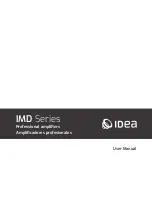
11
NOTICE
RJ45 / CAT5 REFERENCE
1. When adjusting the signal level on the receiver unit, dial the rotary control switch from 7 to 0
and stop turning the rotary switch whenever the audio/video is playing normally. Inappropriate
signal level setting may cause overpowering issues that would shorten the product’s life
significantly!
2. If the DVI or HDMI device requires the EDID information, please use AT-DVISync EDID
Reader/Writer to retrieve and provide EDID information of the DVI or HDMI display or AV
receiver.
3. All HDMI over CAT5 transmission distances are measured using Belden CAT5e 125MHz UTP
cable and ASTRODESIGN Video Signal Generator VG-859C.
4. The transmission length is largely affected by the type of category cables, the type of HDMI
sources, and the type of HDMI displays. The testing result shows solid UTP cables (usually in
the form of 300m or 1,000ft bulk cables) can transmit a lot longer signals than stranded UTP
cables (usually in the form of fixed length patch cords). A solid UTP Cat-5e cable shows longer
transmission range than a stranded STP Cat-6 cable. For long extension applications, solid
UTP/STP cables are the only viable choice.
5. EIA/TIA-568-B termination (T568B) for category cables is recommended.
6. To reduce the interference among the unshielded twisted pairs of wires in a category cable,
doubled shielded STP cables are better suited than unshielded UTP cables to improve EMI
problems, which is worse in long transmission.
7. Because the quality of the category cables has the major effect on how long the transmission limit
can achieve and how good is the received picture quality, the actual transmission range is subject
to one’s choice of Cat-5/5e/6 cables. For desired resolutions greater than 1080i or 1280x1024, a
Cat-6 cable is recommended.
8. If your HDMI display has multiple HDMI inputs, it is found that the first HDMI input [HDMI input #1]
generally can produce better transmission performance among all HDMI inputs.
Summary of Contents for AT-HD15SRS
Page 12: ...10 Diagram ...


































